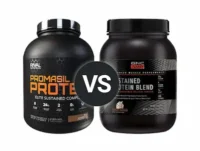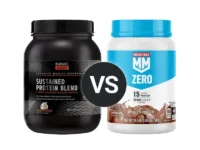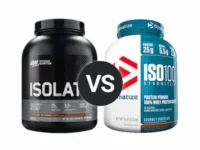Knowledge BaseYou're Questions Answered
What are banned substances in protein powder?
Banned substances are drugs or performance-enhancing substances that are prohibited by sports organizations and other regulatory bodies. Some protein powders may contain banned substances as a result of contamination during the manufacturing process or intentional adulteration. Examples of banned substances that may be found in protein powder include:
- Steroids: These are synthetic hormones that mimic the effects of testosterone in the body. Anabolic steroids are often used to build muscle and enhance athletic performance, but they can have serious side effects and are banned by most sports organizations (1).
- Stimulants: These are substances that increase alertness, energy, and focus. Common stimulants found in protein powders include caffeine, ephedrine, and pseudoephedrine. While some stimulants are legal and widely used, others are banned by sports organizations due to their potential performance-enhancing effects (2).
- Diuretics: These are substances that increase urine production and can help athletes lose weight quickly. However, they can also be used to mask the presence of other banned substances in drug tests, and are therefore prohibited by most sports organizations (3).
- Peptide hormones: These are substances that stimulate the production of growth hormone in the body. Some protein powders may contain peptides that are banned by sports organizations due to their potential performance-enhancing effects (4).
It's important to note that the presence of banned substances in protein powders is typically due to contamination or intentional adulteration, rather than deliberate inclusion by the manufacturer. However, athletes and other individuals who are subject to drug testing should be cautious when using protein powders, and should look for products that have been tested and certified to be free of banned substances.
- World Anti-Doping Agency. Prohibited List.
- Antti A, Rossi KA, Penttilä IM, et al. Protein supplements and doping control. Eur J Sport Sci. 2018;18(3):331-340.
- Hackett DA, Johnson NA, Chow CM. Training practices and ergogenic aids used by male bodybuilders. J Strength Cond Res. 2013;27(6):1609-1617.
- Thevis M, Schänzer W. Detection of the abuse of xenobiotic anabolic steroids in sports. Anal Bioanal Chem. 2016;408(17):4577-4593.
Related Questions
Related Reviews
Your Answer
We are a participant in the Amazon Services LLC Associates Program, an affiliate advertising program designed to provide a means for us to earn fees by linking to Amazon.com and affiliated sites.



